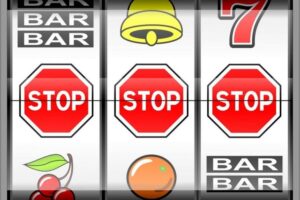Compulsive gambling disorder, or ludomania, is one of the most severe forms of addiction where a person obsessively indulges in casino games, often to the exclusion of all other needs. This manifests in excessive online gaming, particularly in casino settings, significantly impacting productivity, personal interests, and job performance.
Failures or obstacles can trigger aggression and substantial financial losses. Individuals lose control, making gambling the sole purpose of their existence, leading to further communication issues and social withdrawal.
 What is the problem of gambling addiction?
What is the problem of gambling addiction?
Gambling addiction, or ludomania, poses significant dangers to individuals across multiple dimensions: moral, financial, social, and in severe cases, even physical. It brings forth numerous challenges for people unable to control their gambling impulses and involvement.
Foremost are the financial hardships faced by addicted gamblers. They often spend substantial sums at casinos. In the best-case scenario, if a player has funds for a bet and can stop there, it might mitigate immediate losses. However, more commonly, heavily dependent gamblers borrow from family, friends, or take advances at work to fund their next spin. Frequently, they accrue debts from banks or casinos, leaving them with substantial financial burdens and problems. Unfortunately, this is just the tip of the iceberg.
When gambling becomes a priority, it can lead to societal rifts, conflicts with friends and family, and even job loss or workplace penalties. Regardless of the outcome, numerous social issues await, potentially disrupting entire careers and lives.
All gamblers, like any dependent individual, often justify their actions, finding explanations. Such individuals are frequently immersed in depressive states, experiencing feelings of guilt, shame, and heightened anxiety, all of which directly exacerbate their addiction and can lead to more severe disorders.
Furthermore, ongoing stress and anxiety can lead to physical health deviations from the norm, including cardiovascular diseases, digestive problems, and sleep disturbances.
Moreover, the desire for a win can drive individuals to irrational acts, including fraud or theft, ultimately resulting in arrest and imprisonment.
Undoubtedly, any manifestation of gambling addiction requires professional intervention and treatment. Individuals affected by such dependencies should undergo comprehensive therapies, seek advice from specialists, and participate in various support groups and meetings with others combating similar issues. An essential step toward recovery is recognizing the problem, desiring to heal, and committing to the necessary efforts for rehabilitation.
How to recognize problem?
Recognizing a gambling addiction is not difficult, as there are several signs and symptoms that indicate a problem. A person who has lost control often talks excessively about gambling and may even impose their addiction on others.
Here are some signs to identify a problematic gambler:
- Firstly, the person constantly thinks and talks about gambling, their plans, strategies, and the important goal of hitting the jackpot
- They adhere to the idea that increasing bets will make their gaming more effective.
- Attempts to cut down on gambling time are unsuccessful.
- When attempting to quit or abstain temporarily, the gambler becomes extremely nervous, leading to impulsive decisions.
- The addicted gambler often positions gambling as a way to escape problems, claiming it helps them relax.
- Efforts to recover lost money often result in even larger debts for the gambler.
- The addicted individual habitually lies to themselves and others, promising to stop, hiding their gambling from family, friends, or colleagues, and concealing the extent of their financial losses.
- Consequently, this addiction leads to conflicts with others, destroys trust with loved ones, and affects moral balance and attitude towards life and work, diminishing social norms and productivity.
- Moreover, gambling addiction poses legal risks due to potential unlawful actions. Engaging in responsible gambling means avoiding illegal activities or any form of fraud.
- The person loses interest in activities they previously enjoyed. Gambling becomes their sole focus, overshadowing sports, hobbies, and other leisure pursuits.
If you notice any of these signs in someone close to you, it's crucial to seek help from professionals immediately.
Difficulties on the way to cure gambling addiction
The process of recovering from gambling addiction is quite complex and lengthy, involving several stages that require significant moral commitment from the individual.
- Unfortunately, not all gamblers recognize their problem. As a rule, they often deny their addiction and refuse to acknowledge the consequences of their behavior. This denial directly impedes the initiation of treatment.
- First of all, overwhelming sense of shame over poor decisions and fear of admitting mistakes and weaknesses often leads to deeper problems and addiction, plunging the gambler further into depressive states.
- If a gambler has friends or acquaintances who share their views on gambling and often spend time together, their presence and the topics they discuss can negatively impact the recovery process.
- It is well known that addictions often result in significant financial losses. Moreover, attempts to get rid of debt can also affect the recovery process.
- Moreover, it's important to remember that in addition to gambling addiction, other psychological disorders can arise. The most common are anxiety, depression, and substance abuse. In such cases, it is crucial to share all worries, fears, and feelings with a specialist or a trusted person.
- For the recovery process to be effective, it is important to eliminate all triggers from your gambling phase. It is advisable to limit any contact with individuals who might provoke a relapse into destructive behavior, such as uncontrollable betting at casinos.
- For better results, significant lifestyle changes are necessary. This can start with giving up previous habits, creating a new life, and developing healthy habits.
- Above all, family and friends play a crucial role in the recovery of an addicted individual. Their support and influence can significantly aid the patient. Without the support of loved ones and professionals, the recovery process is much slower. In fact, the support and understanding the problem makes us stronger and more confident in the success of the treatment.
- Relapses can occur on the path to recovery. Environmental factors may tempt the recovering gambler, causing a setback. The worst part is that any relapse can undermine the progress of previous treatment and make the individual feel they are failing. To somehow secure your funds, choose a platform only from Online Casino Real Money section. Also, read the terms carefully. In any case, we advise you to completely refrain from any contact with gambling.
In fact, having motivation and goal to strive for is essential in the recovery process. Their absence can render the treatment unsuccessful. The individual must be invested in the outcome of their treatment.
To overcome these challenges, a great deal of patience and determination is required. Therefore, recognizing the problem, striving to resolve it, and seeking professional help are significant steps toward success. All these factors will greatly enhance the chances of overcoming the addiction.
Reintegration into Society
Reintegrating into society after overcoming gambling addiction is a crucial process for a recovering individual. Rehabilitation is essential for returning to a pre-addiction state or adapting to a new life phase without gambling. Many gamblers lose connection with their loved ones due to their unhealthy habits. However, it is always possible to return, adapt to life without gambling, and restore relationships, work, and other aspects of life.
Here are some tips and key points for a successful rehabilitation:
- It is very important to be surrounded by loving, caring people. Their support and advice in any distressing times are vital for your recovery. To facilitate a smoother socialization process, we recommend participating in various self-confidence training sessions and attending support groups. By listening to others' problems, you can analyze your reactions to their behaviors and draw conclusions about your own.
- Above all, groups are excellent for individuals with various types of addictions at different stages of recovery. The sense of support, safety, community, and understanding that your problem is genuinely recognized gives you the strength to move forward. Sharing experiences and advice on overcoming addiction or successful rehabilitation provides additional motivation, making the desired result even more rewarding.
- Working on yourself and overcoming addiction should never cease. Continue to talk with your psychologist or psychotherapist. This can help ease the consequences of the challenges you've overcome.
- Developing a financial plan can help simplify your life, analyze expenses, and set new priorities. Additionally, a plan can assist in restoring financial well-being.
- Diversify your life with new healthy habits. Engaging in hobbies and sports sets new goals for you, distracting you from old habits. You can always fully relax by reading a book or watching a movie instead of gambling.
- After recovery, it is also important to avoid people, places, and items that may be connected to your gambling past. This is crucial to prevent a relapse. Changing your environment, and sometimes even your place of residence, can help you start anew.
- Of course, continuous self-development and improvement are essential. To fully overcome addictions, even after recovery, you need to be strong and keep believing in yourself and the success of your treatment. Self-confidence is part of success and a quality life.
- Set new goals for yourself, such as career advancement, relocating, or strengthening your family. New aspirations and desired results are steps towards self-improvement and a life free from old habits.
- You should always consider different circumstances, possible outcomes, and have a plan in case of a relapse. Make sure to draft an action plan for potential setbacks. Discuss it with your psychologist or ask to create it together during one of your sessions. It is crucial to know how to quickly regain control in such situations and continue your path to recovery.
- Manage your stress and mood swings using various breathing practices that help you calm down and make more rational decisions. Also, continue practicing yoga to learn how to quickly distract yourself and relax.
Undoubtedly, a person's recovery is a comprehensive process that requires dedication and interest. It is important to find new activities or increase training day by day, reinforcing all this with the support of family and friends. Therefore, all those involved in the rehabilitation process from gambling addiction should make efforts to stop gambling addiction. These factors can ensure the overall success of the treatment.
Also, the key is to ask yourself the right questions, set goals, and select the necessary approaches and resources for these goals. The best thing you can do is to aim to build a healthy and fulfilling life.
Hotlines that will help you cope with addiction.
There are many hotlines in different countries that deal with the problems of people with gambling addiction. Moreover, these lines are designed to provide free and anonymous help to people who cannot cope with the excitement and their unhealthy craving for games. A specially trained specialist will always answer the line, who will try to provide immediate and effective support.
People who have suffered from gambling addiction or may be exposed to it are provided with important assistance, as well as resources for more effective therapy.
National hotlines:
USA – National Problem Gambling Helpline (1-800-522-4700). Round-the-clock anonymous help and support.
Canada – Ontario Problem Gambling Helpline (1-888-230-3505). 24/7 hotline support.
United Kingdom – GamCare (0808 8020 133). 24-hour free hotline to help people with gambling addiction.
Singapore – National Problem Gambling Helpline (1800-6-668-668).
South Africa – National Responsible Gambling Program (0800 006 008).
Ireland – Problem Gambling Ireland Helpline (089 241 5401).
Russia – The All (8-800-350-89-32). Round-the-clock anonymous help and support.
Australia – Gambling Help Online (1800 858 858). Round-the-clock support and advice for people with gambling problems.
New Zealand – Gambling Helpline (0800 654 655). Round-the-clock help and support.
International resources:
Gamblers Anonymous (GA): An international community providing support and meetings for people with gambling addiction.
Gam-Anon International: Created to provide support to family members and loved ones of those who have problems with gambling.
Gambling Therapy: International online support and advice for people with gambling problems.
Online resources and forums:
Gamtalk: Online forums and support for people suffering from gambling addiction, as well as for their loved ones.
Gambleaware: Resource with important information on how to combat gambling addiction.
Mobile applications:
GamBan: Restricts access to gambling sites and apps for your devices and accounts.
BetBlocker: Users can utilize this app to block access to gambling sites on various devices.
GamCare: Helps you learn about information and find resources for combating gambling addiction.
QuitGamble: The program includes a 5-day gambling habits test, a happiness test, a supportive community, online courses and guides designed specifically to address the underlying causes of gambling addiction.
Gambling Therapy: A free mobile application that provides access to advice and support for people with gambling addiction. Available on iOS and Android.
If it so happens that you or maybe you think that someone close to you has been influenced by gambling or has already suffered from gambling addiction, it is important to seek professional help at any stage.
In conclusion, seek help only from trusted specialists. By following all the rules and advice, you can achieve significant success in your treatment. If you put in more effort than required, a complete recovery may even be possible. It is important to remember that, in any case, this is a long and arduous process that requires special attention from those around you.
Use all possible ways to do this and use the available resources. Any measures are important for recovery. Do not bring the situation to severe consequences!









